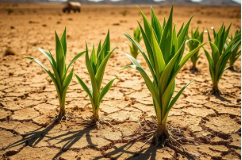
Prices of coconut and its related products have witnessed a sharp rise across Karnataka, as unseasonal rains and prolonged dry spells have severely impacted coconut production in major growing regions of the state.
According to market sources, the price of mature coconuts has risen by 20–30% over the past month, while prices of allied products such as copra, coconut oil, and coir have also seen a significant increase. Traders attribute the spike to a sharp fall in yields caused by erratic weather during the flowering and nut-setting stages.
Weather Disruption Affects Output
Karnataka is one of India’s leading coconut-producing states, with key cultivation zones in Tumakuru, Hassan, Chikkamagaluru, Shivamogga, and Mandya. However, farmers in these regions report a steep drop in nut output due to climate fluctuations first extreme heat, followed by untimely rainfall.
“The flowering was poor this year, and many young coconuts dried up prematurely. The trees are stressed, and recovery will take time,” said Ramesh Gowda, a farmer from Tumakuru. He noted that yields have dropped by nearly 40% compared to last year.
Agriculture experts say the uneven rainfall has disrupted the moisture balance in the soil, leading to water stress in coconut palms. In addition, strong winds during storms have caused physical damage to trees in some areas.
Copra and Oil Prices Also Climb
The shortage of raw coconuts has also driven up copra (dried coconut kernel) prices in local markets, pushing rates beyond ₹13,000 per quintal, up from ₹10,500 a month ago. Coconut oil prices have similarly increased, affecting household budgets and small-scale industries that rely on it.
“Demand remains strong, especially from southern states and for export, but supply is tight,” said a trader from APMC Tiptur. “We expect prices to remain firm unless there’s a recovery in the next harvest cycle.”
Impact on Processing Units and Consumers
The rising prices are putting pressure on coconut-based industries, including oil mills, coir units, and packaged food producers. Many small processors have already scaled down operations due to the higher cost of raw material and reduced availability.
Consumers, too, are feeling the pinch, with the retail price of coconut oil rising by ₹20–₹30 per litre in urban areas like Bengaluru, Mysuru, and Mangaluru.
Government Advisory and Farmer Concerns
In response to the crisis, the Karnataka Agriculture Department has advised coconut farmers to adopt moisture conservation techniques, organic mulching, and irrigation support to protect the remaining crop. Authorities are also exploring compensation measures under crop insurance schemes for affected growers.
Farmer associations are urging the state government to provide input subsidies, soft loans, and a minimum support price (MSP) for coconuts to help tide over the losses.
Unless weather conditions improve and trees recover in the coming months, the shortage is likely to extend into the next production cycle, keeping coconut prices elevated for the near future.














